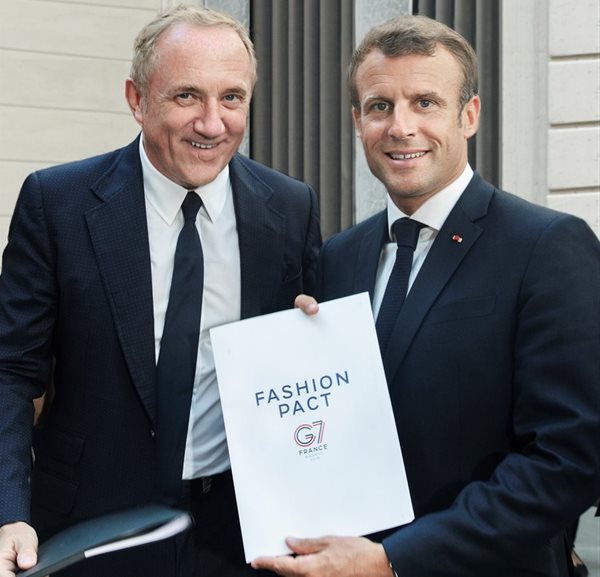
François-Henri Pinault, CEO of Kering, with French president Emmanuel Macron. Credit:
Jean-François RobertThe Fashion Pact was presented to heads of state during the G7 meeting at Biarritz, and representatives of the 32 companies were invited to the Elysée Palace by French President Emmanuel Macron.
Collective endeavour
In April 2019, ahead of the G7 meeting, Emmanuel Macron had given François-Henri Pinault, chairman and chief executive officer of Kering, a mission to bring together the leading players in fashion and textiles, with the aim of setting practical objectives for reducing the environmental impact of their industry.
"Private companies, working alongside nation states, have an essential role to play in protecting the planet. With the Fashion Pact, some leading players in the fashion and textile sector are joining forces for the first time to launch an unprecedented movement. A collective endeavour by its nature, the Fashion Pact is open to any company that wants to help to fundamentally transform the practices of the fashion and textile industry, and to meet the environmental challenges of our century," said Kering in a statement.
The 32 companies from the fashion and textile industry have given themselves a set of shared objectives in the form of the Fashion Pact. The coalition includes groups and brands in Luxury, Fashion, Sports and Lifestyle, along with suppliers and retailers, all of whom are already involved in separate environmental strategies.
The firms that have joined the initiative to date include: Adidas, Bestseller, Burberry, Capri Holdings Limited, Carrefour, Chanel, Everybody & Everyone, Fashion3, Ferragamo, Fung Group, Galeries Lafayette, Gap, Giorgio Armani, H&M, Hermes, Inditex, Karl Lagerfeld, Kering, La Redoute, MatchesFashion.com, Moncler, Nike, Nordstrom, Prada Group, Puma, PVH, Ralph Lauren, Ruyi, Selfridges Group, Stella McCartney, Tapestry and Zegna.
Anika Kozlowski 8 Aug 2019 Objectives
The Fashion Pact’s objectives draw on the Science-Based Targets (SBT ) initiative, which focuses on action in three essential areas for safeguarding the planet:
• Stop global warming: by creating and deploying an action plan for achieving the objective of zero greenhouse gas emissions by 2050, in order to keep global warming below a 1.5°C pathway between now and 2100.
• Restore biodiversity: by achieving objectives that use Science-Based Targets to restore natural ecosystems and protect species.
• Protect the oceans: by reducing the fashion industry’s negative impact on the world’s oceans through practical initiatives, such as gradually removing the usage of single-use plastics.
These commitments are designed to be embraced by every company involved and backed by cross-sector initiatives, along with the deployment of innovation accelerators.
















